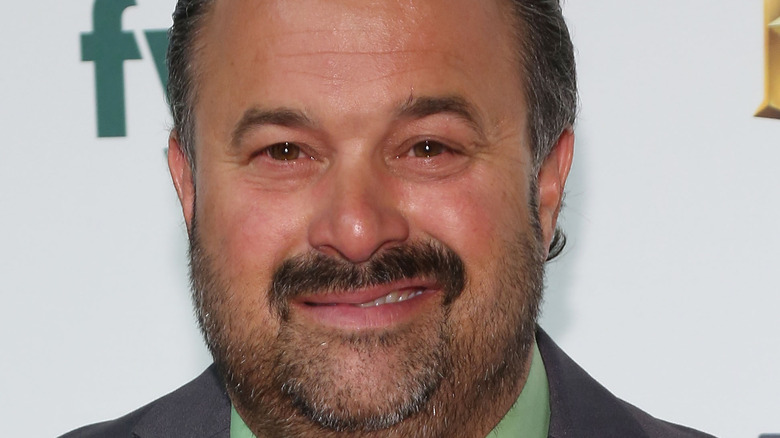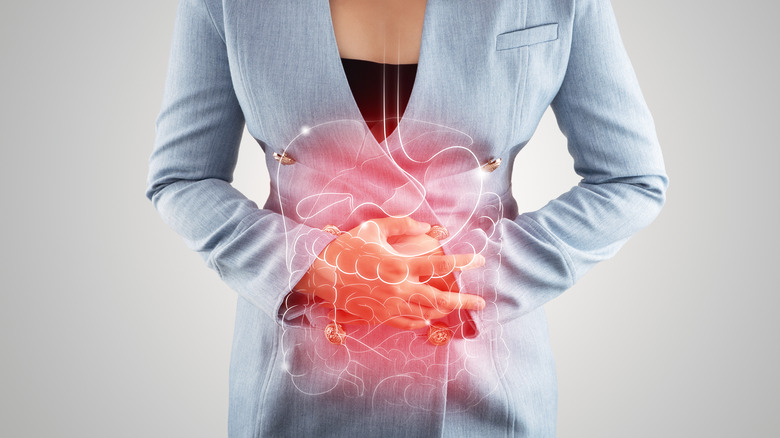American Pickers Star Frank Fritz's Crohn's Disease Explained
"American Pickers" has been reeling in audiences for more than a decade. It debuted on the history channel in 2010 (via IMDb) with hosts Mike Wolfe and Frank Fritz. The two traveled across the country finding lost treasures and bringing them back to the spotlight and back to life, a recipe for success not only for the show but for its hosts.
Recently, however, fans have been worried about Frank. They're worried that his weight loss in recent seasons and his absence from the final few episodes of the last season spelled bad news for the beloved picker. The U.S. Sun reported that Fritz' co-host, Mike Wolfe, has confirmed that Fritz is undergoing back surgery, though neither the paper nor Wolfe seems keen on specifying why.
Back surgery is no laughing matter. And of course fans would be worried about Fritz' recovery. But they can rest easy, at least when it comes to his weight loss. Although rapid weight loss can often be a sign of a serious issue, Fritz has long been open about why he is losing weight. He has Crohn's disease, something he revealed to fans back in 2013.
Of course knowing he has Crohn's and understanding the disease are two very different things. So while fans might be aware of the diagnosis, they might not understand what the disease has to do with Frank's absence from the show. Or what it could mean for his future return.
What is Crohn's?
The Crohn's and Colitis Foundation states that Crohn's disease is a condition in which any part of the digestive tract becomes inflamed. Although the most common forms affect only two or three sections of the tract, the disease could theoretically affect everything from the mouth through the stomach and intestines to the anus. The tract becomes inflamed and, in extreme cases, can develop abscesses or fistulas.
Crohn's disease can present in one of five forms, each named for the section of the digestive tract that it affects. Gastroduodenal Crohn's affects the stomach and beginning of the small intestine, known as the duodenum. After the duodenum is the jejunum or the upper half of the small intestine, which can be affected by a form known as jejunoileitis. Ileitis is the version that affects the end of the small intestine or the ileum while the most common form of Crohn's, ileocolitis, affects both the ileum and the large intestine, aka the colon. When the disease affects only the colon, it is known as Crohn's colitis.
Although these five forms affect different parts of the digestive tract, they all share similar symptoms. Abdominal pain, regular diarrhea, vomiting, and significant weight loss are all common symptoms. They're some of the hallmarks doctors look for when diagnosing a case before they move into more detailed testing.
Diagnosis methods
In addition to observing the more visible symptoms of the disease, doctors will often require further testing before they diagnose someone with Crohn's, according to the Mayo Clinic. First they run a blood test to check for anemia. After that they may require a stool or poop sample to check for bacteria or parasites.
Neither of these tests will prove that a person has Crohn's disease, but they will rule out other possible conditions. Once those other options have been ruled out, the doctor will move to more digestion-specific tests. These can include a colonoscopy, a capsule endoscopy, or a balloon-assisted enteroscopy.
Colonoscopies are usually used to spot colon cancers, according to Harvard Health Publishing. The procedure allows a doctor to see the inside of the large intestine using a small camera which can spot small cancers that other screening options miss, but can also spot the inflammation that marks Crohn's disease.
Capsule endoscopies and balloon-assisted enteroscopies, on the other hand, are ideal for checking the small intestine. The Mayo Clinic explains that capsule endoscopies require the patient to swallow a capsule with a small camera in it, that then transmits the images to a device hooked to the patient's belt. And Johns Hopkins describes a balloon-assisted enteroscopy as a process by which doctors inflate or deflate sections of a device that allows them to reach difficult areas of the digestive tract.
Common treatment options
The Mayo Clinic tells us that there is no cure for Crohn's Disease. It can be managed, however. Many people with the condition build the foundation of their disease management on a healthy diet, regular exercise, and the use of vitamins. But these approaches are usually not enough on their own. There are several additional drugs that patients may use.
High-grade anti-inflammatory drugs are the most common treatment. These days doctors usually stick with corticosteroids. They used to prescribe drugs known as oral-5 aminosalicylates, but modern studies have shown that the drugs are not as effective as other options, and they have fallen out of favor.
Another common prescription is for immunosuppressive drugs. These might not seem like an obvious choice at first. But just as there is no cure for Crohn's disease, scientists aren't sure what causes the disease. A prevailing theory, however, is that it's a misfiring of the body's immune response, which is why the disease is marked first and foremost by inflammation.
Immunosuppressive drugs help curb this inflammation by diffusing the immune system's response. And while this helps, it comes with its own risks. These drugs can cause liver inflammation and open up patients to other infections. This is why they are only prescribed when a doctor can regularly perform checkups to ensure the patient's overall health.
Targeted treatment options
A third drug option goes a bit further than the other two. These drugs are known as biologics and they are described by the Mayo Clinic as a "class of therapies" that target specific proteins given off by the immune system. These proteins are known as integrins and when they bind to other cells in the intestinal lining, they can cause inflammation.
There are two main drugs used to stop integrin from binding. The first is natalizumab and the other is vedolizumab. Both drugs work in similar ways, but the first is linked to a degenerative brain disease known as progressive multifocal leukoencephalopathy. The disease can lead to disability or death. Because of this, the drug is tightly regulated and usually only used when other treatment options will not work. Vedolizumab, approved in 2013, does not carry this risk and is more widely used.
Even with these treatments, however, people with Crohn's disease will still suffer their usual symptoms. In Frank Fritz's case, this includes the need for special accommodations while filming. The Quad-City Times reported in 2011 that this included an RV at all filming locations that was set aside for Fritz' bathroom needs as well as a place for both hosts to rest. Fritz also reported that the entire crew knew of his diagnosis and understood his frequent and sometimes oddly timed breaks.
Frank's future
As of right now, Frank is not credited with any episodes in the 2021 season of "American Pickers". But that doesn't mean that a return is impossible. As Mike Wolfe said, Fritz is currently undergoing back surgery and the often lengthy recovery that follows that sort of procedure.
Whether or not he returns, one thing is for sure. Frank Fritz is a man determined to live his life to the fullest despite a diagnosis that can be incredibly hard to manage. The Mayo Clinic reports that Crohn's can even lead to life threatening complications like blood clots and malnutrition. But Fritz is not the type of man to let the condition go untreated.
As far back as 2011, according to The Quad-City Times, Fritz belonged to a Crohn's support group. He's appeared in Crohn's advocate magazines and is vocal about his diagnosis because he wants others to see that a full life is possible, even with a disease like Crohn's. One way or another, he will end up back on his feet, showing the world just what can be done when you have Crohn's.






